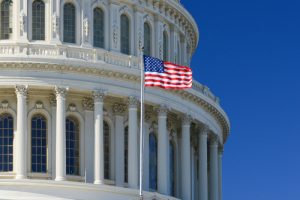
The beginning of 2018 finds U.S. Sen. Shelley Moore Capito (R-WV) and U.S. Reps. Brian Fitzpatrick (R-PA), Bruce Poliquin (R-ME) and Mike Turner (R-OH) making headway in the fight against opioid addiction and setting plans for continued legislative work on an issue that has hit their states hard.
On Jan. 10 at the White House, Capito and other lawmakers joined President Donald Trump as he signed into law bipartisan legislation she introduced in the Senate to prevent illicit opioids from entering the United States.
Specifically, the INTERDICT Act, short for the International Narcotics Trafficking Emergency Response by Detecting Incoming Contraband with Technology Act, will ensure that U.S. Customs and Border Patrol has sufficient personnel, technology, and facilities to detect synthetic opioids like fentanyl before they can be brought into the country.
“West Virginians are far too familiar with the devastating consequences of the opioid epidemic, and we lose more people to overdose deaths per capita than any other state in the country,” Capito said. “While enforcement is only part of the opioid fight, it’s an important one,” she added.
Capito’s bill, S. 708, was also introduced by Sens. Edward Markey (D-MA), Marco Rubio (R-FL) and Sherrod Brown (D-OH). The companion legislation in the House, H.R. 2142, was led by Reps. Brian Fitzpatrick (R-PA) and Niki Tsongas (D-MA) and was cosponsored by Rep. Tom MacArthur (R-NJ).
“In 2016, more than 42,000 Americans died from an opioid overdose, with nearly half being directly attributed to fentanyl and other synthetic opioids,” Fitzpatrick said, adding that blocking illicit drugs from Mexico and China is critical.
Meanwhile, members of the Bipartisan Heroin Task Force in the House released its 2018 legislative agenda this week packed with measures on opioid-addiction prevention, treatment, and recovery, as well as law enforcement and criminal justice efforts.
MacArthur serves as co-chair of the Bipartisan Heroin Task Force with Democrat co-chair Rep. Ann McLane Kuster of New Hampshire, while Fitzpatrick is Republican vice chair.
Their legislative agenda addresses special concerns of families, veterans, medical providers and rural communities that are fighting the opioid epidemic.
Among the bills on the agenda is one that has drawn strong support from Rep. Bruce Poliquin (R-ME), the Caring Recovery for Infants and Babies (CRIB) Act. H.R. 2501 was introduced by Rep. Evan Jenkins (R-WV) on May 17, 2017 and cosponsored by both Poliquin and Rep. Turner.
Poliquin’s office in a statement noted that nearly 1,000 Maine babies are born addicted to drugs each year, and the CRIB Act he has cosponsored would enable low-income families to use residential pediatric care centers with specialized care providers familiar with the particular needs of addicted infants and their families. Turner also signed on as an original cosponsor of the CRIB Act.
“As someone who grew up in a healthcare family with my mother working as a nurse and having lost my own brother to substance abuse, I understand firsthand the seriousness and horror of this epidemic in Maine,” said Poliquin, a founding member of the task force. “This is not a partisan issue, and it’s vital we work together as lawmakers from across the aisle and from all different parts of our country.”
Turner’s bill, The Reforming and Expanding Access to Treatment (TREAT) Act, was also included on the task force’s legislative agenda. H.R. 982 supports treatment for incarcerated addicts to help them take productive roles in society and stop the addiction and recidivism cycle. Cosponsors of the bill that was introduced on Feb. 7, 2017 include Reps. Dan Donovan (R-NY) and Glenn “GT” Thompson (R-PA).
“There is a short window of opportunity between getting someone off the streets and getting them into treatment,” Turner said. “The TREAT Act works to provide communities with the resources to help individuals access treatment for addiction.”
Both House bills are awaiting consideration by the Energy and Commerce Subcommittee on Health.
MacArthur said the task force’s agenda reflects “the important balance of showing compassion for those suffering with substance abuse, while stopping the flow of drugs into our neighborhoods. It’s a crucial step in this fight.”



